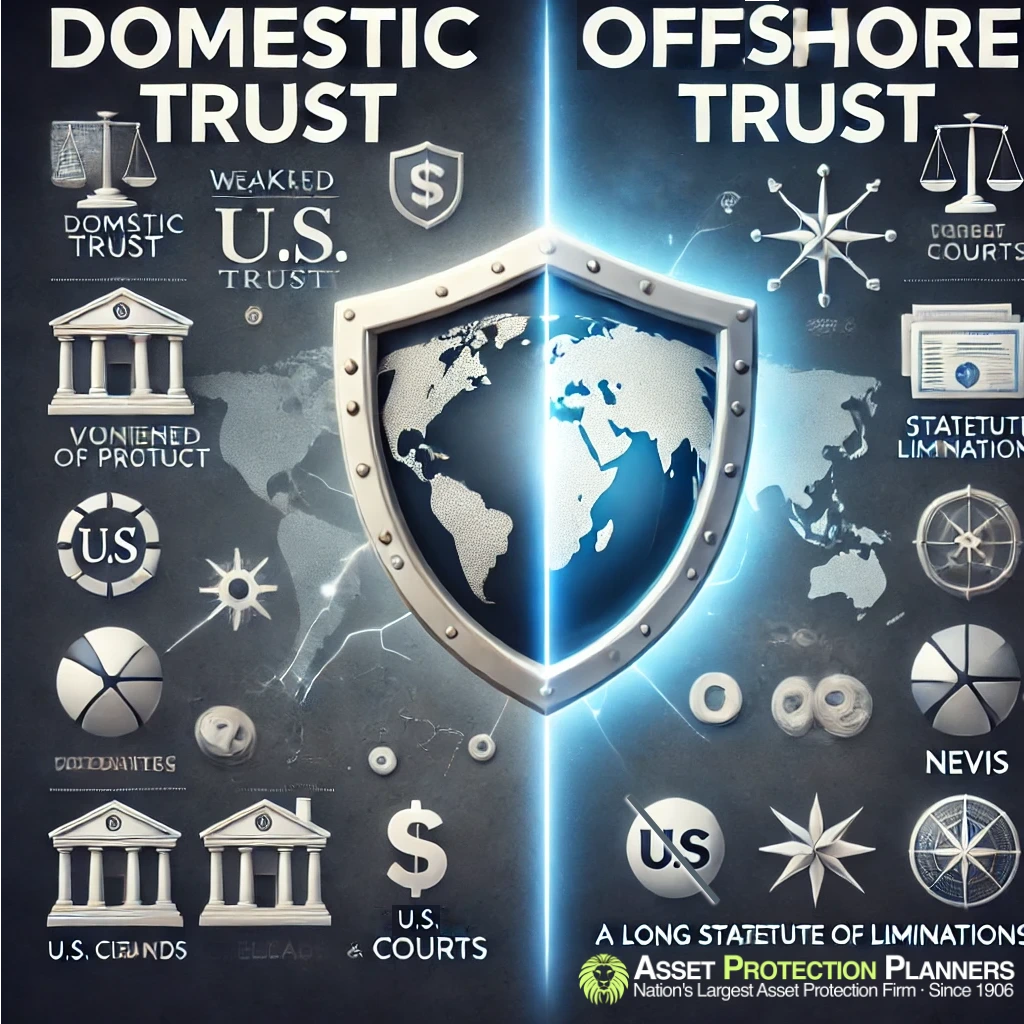
In today’s litigious world, safeguarding your hard-earned assets from potential lawsuits is more critical than ever. Asset protection isn’t just about preserving wealth; it’s about securing your financial future and peace of mind. As a leading authority in asset protection since 1991, the management of Asset Protection Planners has helped, we believe, over 102,000 clients navigate the complexities of shielding their assets. In this comprehensive guide, we delve into the history, methods, and nuances of shielding your assets from lawsuits. We emphasize the unparalleled strength of offshore trusts, particularly in jurisdictions like the Cook Islands, Belize, and Nevis.
The Evolution of Asset Protection: A Historical Perspective
The concept of asset protection isn’t new. Throughout history, individuals have sought ways to shield their wealth from creditors and adversaries. Early examples include medieval castles and hidden vaults. In modern times, the rise of complex legal systems and increased litigation has fueled the development of sophisticated protective strategies.
The 1980s saw a surge in asset protection planning in the United States. This was driven by factors such as rising professional liability claims and a growing awareness of the importance of financial security. Offshore trusts emerged as a powerful tool for safeguarding assets from the reach of U.S. courts.
For example, the legislature passed Cook Islands International Trusts Act in 1984. Though technically passed in 1992, the Belize Trusts Act draws from earlier asset protection models developed in the 1980s. In 1984, the Caribbean island of Nevis passed the Nevis International Exempt Trust Ordinance, which offers similar benefits to the Cook Islands law. The Bahamas passed the International Trusts Act of 1989; which was influenced by the success of the Cook Islands’ legal framework.
Understanding the Limitations of Insurance
Some falsely believe that insurance is as a primary line of defense against legal liability. However, it is crucial to recognize its limitations. Insurance policies typically have coverage limits, exclusions, and conditions that can leave you wide open to lawsuits. Moreover, insurance companies may aggressively contest claims or even deny coverage altogether.
Denial of Insurance Claims
Insurance companies may deny claims for a variety of reasons. Below are some common examples:
- Failure to Disclose Information: Not providing accurate or complete information during the application process.
- Omitting Prior Claims: Failing to report previous claims can result in denial.
- Policy Exclusions: Insurance company may exclude certain events, such as natural disasters or intentional acts from coverage.
- Natural Disasters: Companies may deny damage from events like floods or earthquakes unless specifically added to the policy.
- Intentional Acts: Insurance does not cover damage or losses caused by intentional actions.
- Wear and Tear: Institutions typically exclude gradual deterioration from coverage.
- Lapsed Policies: Late or missed premium payments can cause a policy to lapse, resulting in claim denial.
- Negligence or Failure to Prevent Damage: Not taking reasonable steps to maintain or protect your assets can lead to denial.
- Uncovered Perils or Events: Claims for events not listed in your policy as covered risks may be denied.
- Violation of Policy Terms: Any violation, whether intentional or accidental, can invalidate your claim (e.g., driving under the influence).
- Hiring Unlicensed Contractors: Using unlicensed workers may void your coverage in the event of damage.
- Fraudulent Claims: If a lawsuit accuses you of fraud, even if unfounded, the insurance company may deny your claim.
Insurance is Far from Foolproof
In the context of asset protection, insurance can be valuable for mitigating specific risks, such as property damage or professional liability. However, it’s not a foolproof solution for shielding your assets from all potential threats. A comprehensive asset protection plan goes beyond insurance, incorporating proactive strategies to safeguard your wealth from lawsuits and creditors.
Methods of Asset Protection: A Multifaceted Approach
Asset protection involves a combination of legal and financial strategies designed to create barriers between your assets and potential claimants. Common methods include:
- Asset Titling: Strategically titling assets in the names of trusts, LLCs, or other entities can offer a layer of protection.
- Exemptions: Statutory exemptions, such as homestead exemptions or retirement account protections (e.g., 401(k)s), can safeguard certain assets from creditors.
- Liability Insurance: Maintaining adequate liability insurance can help cover legal costs and potential damages in the event of a lawsuit.
- Prenuptial and Postnuptial Agreements: These agreements can establish property ownership and help protect assets in the event of a divorce. However, they require each spouse to have separate legal representation, which can be cumbersome. In comparison, asset protection trusts often provide a more effective and streamlined solution.
- Domestic Asset Protection Trusts (DAPTs): While DAPTs offer some protection, they are generally less robust than offshore trusts. That is, they can be vulnerable to challenges in U.S. courts.
- Offshore Asset Protection Trusts (OAPTs): Experts agree that OAPTs are the most powerful legal tools to protect assets from lawsuits. This is mainly because U.S. courts do not have jurisdiction over foreign trusts or our law firm/trustee company.

The Power of Offshore Trusts: Unparalleled Asset Protection
We establish offshore trusts in jurisdictions with strong asset protection laws. As such, they offer unparalleled advantages in safeguarding your wealth from lawsuits and creditors. Key benefits include:
- Strong Legal Frameworks: Offshore jurisdictions like the Cook Islands, Belize, and Nevis have well-established legal systems that prioritize protection from creditors. Their trust laws are designed to resist challenges from foreign courts, including U.S. courts.
- Foreign Trustee: The appointment of a foreign trustee company / law firm adds an additional layer of protection. U.S. courts generally have limited jurisdiction over foreign trustee companies, making it difficult for creditors to access trust assets.
- Privacy and Confidentiality: Offshore trusts offer a high degree of privacy and confidentiality, shielding your financial affairs from prying eyes.
- Flexible Asset Management: Offshore trusts allow for flexible asset management. This enables you to maintain control over your investments while enjoying the benefits of asset protection.
Cook Islands Trusts: The Gold Standard in Asset Protection
What is a Cook Islands trust? The Cook Islands, a self-governing island nation in the South Pacific. It is widely recognized as the premier jurisdiction for asset protection trusts. The Cook Islands International Trust Act of 1984 provides a robust legal framework for protecting assets from creditors. Key features include:
- No Recognition of Foreign Judgments: The Cook Islands does not recognize foreign judgments, including U.S. judgments, against trust assets.
- Short Statute of Limitations: A one-year to two-year statute of limitations for fraudulent conveyance claims makes it challenging for creditors to challenge the transfer of assets to a Cook Islands trust. Notably, the trust protects assets right away. However, the courts will refuse to hear transfer challenges after the requisite time has elapsed.
- Strong Confidentiality Provisions: Strict confidentiality laws protect the privacy of trust beneficiaries and assets.
- Experienced Trustees: The Cook Islands boasts a network of experienced and reputable trustee companies that specialize in protecting assets from lawsuits.
Belize and Nevis: Strong Alternatives
Belize and Nevis, two Caribbean nations with favorable asset protection laws, offer compelling alternatives to the Cook Islands. Both jurisdictions have enacted legislation specifically designed to protect trust assets from foreign creditors.
- Belize Asset Protection Trusts: Belize’s trust legislation is modeled after the Cook Islands. Thus, it offers similar benefits such as non-recognition of foreign judgments and an even shorter statute of limitations. Specifically, as soon as the assets are in the trust, beyond your local court’s reach, Belize law protects them.
- Nevis International Exempt Trusts: Nevis’s trust laws are known for their flexibility and strong creditor protection provisions. Nevis trusts offer advantages such as the ability to decant trust assets to another jurisdiction and provisions for protecting trust assets from divorce claims.

Domestic vs. Offshore Trusts: A Comparative Analysis
While domestic asset protection trusts (DAPTs) exist in some U.S. states, they generally offer weaker protection compared to offshore trusts. Key differences include:
- Jurisdictional Limitations: DAPTs are subject to the jurisdiction of U.S. courts, making them vulnerable to challenges from creditors.
- Recognition of Foreign Judgments: U.S. courts generally recognize foreign judgments, potentially allowing creditors to access DAPT assets.
- Longer Statute of Limitations: DAPTs typically have longer statutes of limitations for fraudulent conveyance claims, giving creditors more time to challenge asset transfers.
- Nonrecognition: States without DAPT laws usually do not recognize the protection offered in the DAPT jurisdiction. For example, California courts routinely order asset seizure from Nevada trusts.
Asset Protection Beyond the United States: A Global Perspective
While this guide primarily focuses on the United States, our organization serves clients globally. This, it’s essential to recognize that asset protection strategies vary across different countries.
- Canada: Canadian asset protection laws are generally less favorable than those in offshore jurisdictions. However, strategies such as inter vivos trusts and holding companies can offer some protection.
- United Kingdom: The UK has a well-developed legal system that generally respects trusts. However, recent changes in legislation have made it more challenging to establish trusts for asset protection purposes.
- Australia and New Zealand: Both countries have robust legal systems. They offer some protective options, such as discretionary trusts and testamentary trusts. However, offshore trusts may still provide stronger protection in certain situations.
Here’s the good news: despite domestic limitations, offshore trusts have proven highly effective. We have consistently seen them protect assets for individuals in all of these jurisdictions.
Conclusion: Proactive Asset Protection for a Secure Future
Asset protection isn’t just for the wealthy. It is a crucial aspect of financial planning for anyone seeking to safeguard their hard-earned assets. By understanding the history, methods, and nuances of asset protection, you can make informed decisions to protect your wealth from potential threats.
Offshore trusts, particularly in jurisdictions like the Cook Islands, Belize, and Nevis, offer unparalleled advantages in shielding your assets from lawsuits and creditors. Their strong legal frameworks, foreign trustees, and privacy provisions create a formidable barrier against those seeking to access your wealth.
As the largest such company in the United States, Asset Protection Planners has the expertise and experience to guide you through the complexities of wealth preservation planning. We believe we’ve helped over 102,000 clients achieve financial security and peace of mind. Contact us today to learn more about how we can help you protect your assets and secure your future.
Asset Protection from Lawsuits Frequently Asked Question
How can I protect my assets from a lawsuit?
As American lawsuits continue to climb, protecting your assets from lawsuits has become increasingly important. Every year, thousands fall victim to aggressive lawyers who, with little effort, can lay claim to everything from your savings and investments to your real estate and business. Luckily, there are several ways to protect assets from lawsuits. We’ll walk you through some of the most popular asset protection methods and explain how they work.
Establishing an asset protection trust is one of the most powerful ways to protect your wealth in a lawsuit. Asset protection trusts are legal mechanisms that allow you to transfer your assets into them, removing them from your possession and ensuring their safety during legal proceedings. There are various trust types, including revocable, irrevocable, domestic, and offshore. Each offers a different level of protection.
If you are looking for the trust type that provides the greatest level of asset protection from lawsuits, we recommend establishing an irrevocable offshore trust. When established properly, they provide comprehensive asset protection from lawsuits. When established properly, irrevocable does not mean that you can’t change it. It just means that a court cannot force you to change it.
Insurance is another common tool many use to guard assets. However, this method poses many problems. First, insurance does not generally protect your assets from seizure. Second, insurance companies often resist paying claims due to exceptions in the policies. Third, someone can sue you for an amount that is beyond your insurance limits. So, the main benefit is that certain types of liability insurance can cover some of what you’re ordered to pay if a judgment is rendered against you. That said, liability insurance is recommended for anyone with an elevated probability of being sued, such as a lawyer or doctor.
The way you establish your business can also help protect your assets. Creating a limited liability company (LLC) or a corporation adds an extra layer of protection between you and a business lawsuit. Remember to be diligent about separating your personal and business assets for these business structures. Doing so will properly protect your wealth.
Even setting up a retirement account, like an IRA or a 401(k), can guard you against a lawsuit in certain states. The 401(k) accounts have federal and state legal protections, offering a combination of creditor protection and growth potential. However, it’s important to understand the limitations and regulations surrounding these protections. For example, in states such as California, if a judge thinks you can support yourself in another manner during retirement, the judge can seize your IRA. Likewise, non-qualified deferred compensation plans are generally vulnerable.
As you can see, there are several ways to protect your assets from lawsuits, and each comes with unique benefits and drawbacks. The most powerful strategy is the international asset protection trust. If you are concerned about personal lawsuit risk, the sooner you act, the better your chances of weathering the legal storm.



